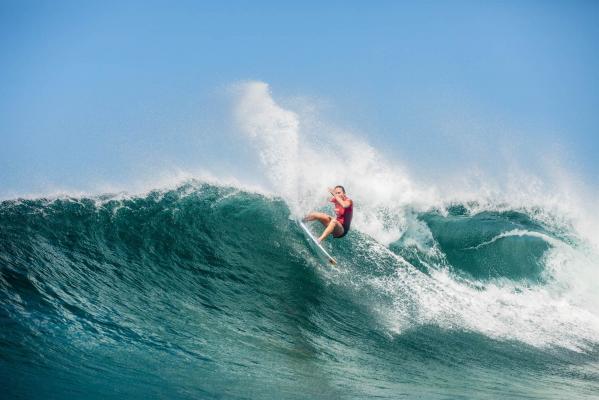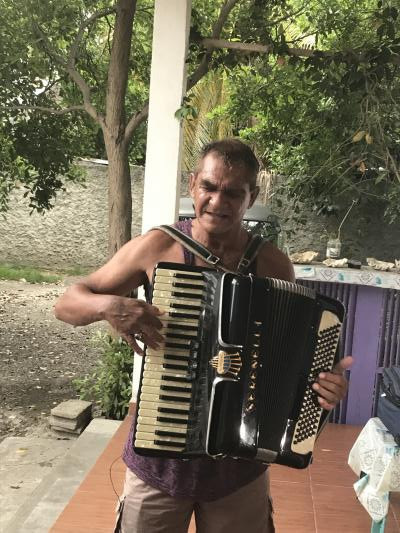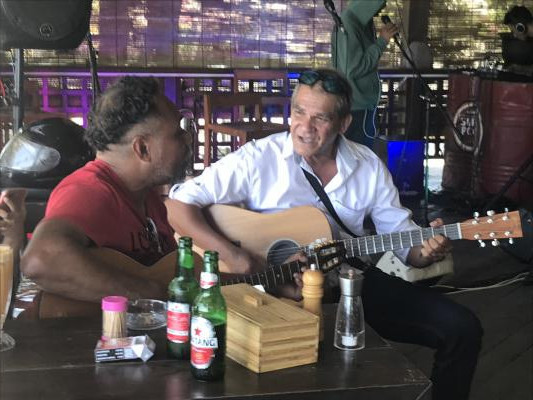Although I had no personal animosity towards HRH Prince Philip – in fact my monarchist mother named me after the playboy Greek naval officer who had recently married the heir to the throne, and I rather admired the old chap’s appallingly inappropriate sense of humour – I thought 2JJJ got their priorities right when they led the news with the death of rapper DMX and slipped Prince Phil in down the line.
Besides which, on the same day, along with most of poor little flood-battered Timor-Leste, I was already in mourning for a courageous and spirited man whose small life passed unnoticed outside his beloved island home, but meant so much to those who knew him and his incredible story.
Tewantin-based filmmaker Shaun Cairns and I first met Toto Lebre a few years back when we were just starting to film a story about how art and music had made such a significant contribution to the Timor Leste resistance movement, leading to the country’s independence in 2002.
Our first point of reference was Toto, then in his early 60s, an amazing multi-instrumentalist who was the youngest member of the groundbreaking Cinco Do Oriente band in the early 1970s, and was by then its sole survivor. Although they played mostly Creedence and Hendrix covers at the start, Cinco had attitude, and they didn’t like being subjugated by the Portuguese, and then by the Indonesians. They were card-carrying members of the Fretilin resistance, and when revolutionary sentiment began to infiltrate their lyrics, three of their members were “disappeared” outside the Hotel Dili after a gig, and were never seen again. Toto, still a teenager, ran for the hills.
Toto had just driven 10 hours of bad road from his home in Kupang, West Timor and was exhausted, but we sat in his mother’s tiny courtyard in Dili while I interviewed him on camera through an interpreter. When I asked him about the murder of his band-mates he wept. We all wept that afternoon, then Toto disappeared inside the house and came out with an ancient accordian and played a happy song. Then we sent out for beers and wept again. Although our common language was limited, we formed an immediate bond.
At about the same time as Toto was hiding in the mountains in the 1970s, four-year-old Ego Lemos and three siblings were taken by their parents into a hastily-built camp deep in the jungle, where they were to spend the next half-dozen years avoiding militia patrols and living hand to mouth. But malnutrition and bullets claimed most of the family, and only Ego and his mother survived, eventually moving back to a safe house in Dili.
By the mid-1990s, the Indonesian occupation force had begun to loosen its ban on Timorese music, and Ego Lemos had formed a band that was soon the most popular in Dili. One night at a gig he was approached by Toto Lebre, who suggested that he call the band New Cinco Do Oriente, and once again carry the resistance flag on stage, at least metaphorically. Frightened of the possible consequences, Ego accepted the challenge anyway, and Cinco was once again the voice of free Timor.
In 2019, as Shaun and I approached the end of filming Generation 99, we realised that there were huge gaps in our Timor music archive, so, working with Timorese singer/songwriter Joviana Guterres, I put together a three-hour show at a moment’s notice and on a shoestring budget. The legends of Timorese popular music gathered in front of a small crowd at the rundown Esplanada Hotel on the waterfront, led by the country’s most popular troubadour, Ego Lemos, and its most revered musical pioneer, Toto Lebre.
That wonderful afternoon we brought together the surviving members of three generations of bands whose music, banned for many years under occupation, had been the salvation of so many people, the soundtrack of the resistance. Toto never forgot, and he was present a few months later when we premiered our film in Dili during the 20th anniversary of the independence referendum, during which so many innocent Timorese had lost their lives.
In the film Toto tells me: “I’ll play music until I die. And perhaps in my grave I’ll still be playing.” And now, 18 months later, Maun Toto Lebre is gone too soon. Hau nia sentidos condolencias mais profundo ba familia enlutada!
Big finish in Newcastle for WSL
The World Surf League’s first leg of its Australian tour ended on a high note in Newcastle last Saturday with beautiful waves at Merewether for the finals. Perhaps predictably, the Brazilian Storm dominated the men’s finish, with Italo Ferreira and Gabriel Medina high-flying to first and second respectively, but nothing was really predictable at Newie.
The locals, Ryan Callinan and rookie Morgan Cibilic both surfed brilliantly and could have easily made the final, had they not met in the quarters. And the women’s came down to a lesson in how to dominate a final delivered by Hawaii’s brilliant Carissa Moore to Coolum’s courageous Isabella Nicholls. This is to take nothing away from Isabella, whose super-smooth clean lines are going to take her a long way, now that she’s finally on the big tour.
But it was the reigning world champions, Italo and Carissa, who won the day and are back in the yellow jerseys this week at Narrabeen.










